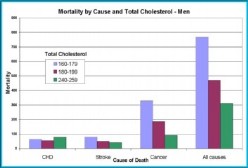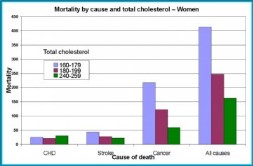This study was published in Nippon Eiseigaku Zasshi (Japanese Journal of Hygiene) Vol. 62 (2007), No. 1 p.39-46
Study title and authors: Estimation of Effect of Lipid Lowering Treatment on Total Mortality Rate and Its Cost-Effectiveness Determined by Intervention Study of Hypercholesterolemia |
| Chihoko KAME1), Akira BABAZONO2) and Eiji YAMAMOTO3) |
| 1) Department of Health Care Administration and Management, Graduate School of Medical Sciences, Kyushu University 2) Department of Health Care Administration and Management, Faculty of Medical Sciences, Graduate School of Kyushu University 3) Department of Information Science, Faculty of Informatics, Okayama University of Science This study can be accessed at: http://www.jstage.jst.go.jp/article/jjh/62/1/62_39/_article |
This study analyzed data from 55,000 people aged between 35 and 70 and estimated the effects on death rates of cholesterol levels decreasing from 240-259 mg/dL (6.24-6.73 mmol/l) to 160-179 mg/dL (4.2-4.6 mmol/l) by use of drug therapy.
See the graphs below for results:

For a larger image click here

For a larger image click here
The results show:
(a) In men, cholesterol levels falling from 240-259 mg/dL (6.24-6.73 mmol/l) to 160-179 mg/dL (4.2-4.6 mmol/l) would increase the death rate by 145%.
(b) In women, cholesterol levels falling from 240-259 mg/dL (6.24-6.73 mmol/l) to 160-179 mg/dL (4.2-4.6 mmol/l) would increase the death rate by 154%.
To conclude: The study showed that it is very clear that the lower your cholesterol is, the more likely you are to die. This was the same for all ages between 35 and 70, and for both sexes.